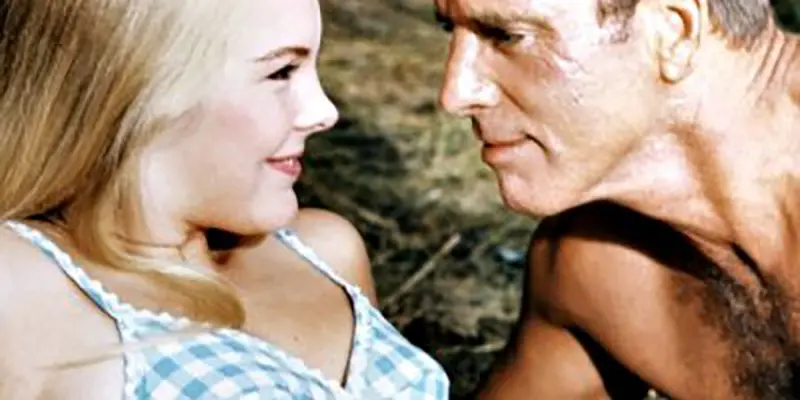THE SWIMMER: Decadence, Decay & The American Dream

Chris is a B.A.H. graduate with a concentration in pre-19th…
Frank Perry ’s 1968 film The Swimmer is adapted at length from the 12-page short story of the same name by famed American author John Cheever . It is the story of Ned Merrill (perhaps the finest performance of Burt Lancaster ’s impressive career), whose summer culminates in a trip through various neighbours’ pools until reaching his own home at the end of a large and affluent county of mansions. Only, what starts as a summer begins to feel as if it goes on for years.
The Swimmer is a story about disappointment on the surface. Underneath, Ned represents the death of the American Dream. Perry takes the audience on a surreal journey through the lifestyles of the rich and bored, the sort of people who only seem to complain about their hangover from last night’s binge, or talk about their material possessions. Ned initially appears part of that world, an upper class bourgeois-type. Soon, both he and the audience come to discover that, while the liquor’s been drunk and the parties have raged, the fleeting American Dream has eluded him. By the end, Ned literally stands at the foot of his broken dreams after a surrealist voyage through time and space.
Ned Sleeps Through the American Dream
From the moment Burt Lancaster traipses up into a sprawling green garden, there is an immediate sense of being amongst the upper class. Then he steps onto a deck before diving into a shimmering pool of clear water. The first sign of another human being we see is someone handing Ned a drink with a lemon twist in it. In fact, though we see him next with his friend Donald Westerhazy, the shot is cut audibly and visually in a way which doesn’t confirm who hands over the drink; the first sign of a surreal adventure to come. The conversation is ambiguous, as far as Ned is concerned.
Gradually, we get the sense of his obliviousness; it’s not evident straight away. Once Ned is done at the Westerhazys, he initiates his lengthy swim. The surrealism moves him along and takes us through a man’s decline. Rather than watch Ned on his journey, we are whisked away into his oblivious state of mind. He enters a pool in one yard only to emerge in a completely different yard, with different neighbours waiting at the opposite end. Often one scene transitions to the next by way of shots disappearing into light and sunspots, as we watch scenes with Ned heading to another pool, hearing the dialogue via voiceover. These techniques in The Swimmer throw the audience off balance, essentially putting us into the decadent obliviousness which he experiences.

The oblivious nature of these people is painfully shown when Ned catches a ride up to one of the houses with an African American chauffeur. The man knows him, yet Ned remains clueless, going so far as to unintentionally offend the man by confusing him with the previous driver. Their exchange ends awkwardly, while the ignorant racism of the upper crust comes across brutally. The decadence is most clear with all the fawning over the latest lawn equipment, pricey pools, and the fact that everybody perpetually holds a glass of top shelf liquor.
The main topic of conversation in The Swimmer is last night’s drunk and how each of them are paying for it this morning. Their only other talk concerns material possessions or a show of interest in what the next person does for a living. We find out Ned used to own a Jaguar. In a later scene, one man talks about how the Merrills would order expensive French jams from his store.
During a large party, guests eat caviar out of a massive dish the way most of us eat tortilla chips and salsa; one specific shot shows the greedy hands of slobbish rich folk piling high their crackers. Joan Rivers in her first non-comedic feature film role plays a party guest, aptly named Joan, who talks with Ned about social status. This conversation ends quickly, with a man pulling Joan away to tell her about the man with whom she’s talking.
What really hammers home the decadence of this upper class neighbourhood is the fact they are so involved in their ideas of status that Ned is all but openly ostracised for being at the party. Infinitely more sad is that this incident doesn’t bring him around to reality, foreshadowing that it’s likely nothing ever will.
The Decay of Decadence
As a result of decadence in The Swimmer , Ned sees his personal slice of the American Dream and sense of self without money or status decay rapidly. One of the prominent themes in this adaptation, as opposed to the Cheever story, is the idea of lost youth, or a perceived loss of manhood in Ned’s case. For instance, one major addition is that of Julie, a former babysitter employed by the Merrills. She ends up accompanying Ned on his swim. That is, until he makes a move to kiss her, after which she runs off. This is a crushing symbol of his faded youth; no longer is he the studly young man he once was.
An even more obvious bit of symbolism is an earlier encounter with a horse in an open field. Ned challenges the horse to a race. He doesn’t win, obviously, but it’s the idea of him trying to stay youthful, strong enough to race a horse. The scene is jarring because it comes so unexpectedly, right after Ned has announced his intention to swim the whole county home. Then, out of nowhere, he races this horse. A lighthearted, silly moment? Or something more?

This leads to the ultimate symbol of Ned trying to retain a semblance of youth, at the same time making clear he is oblivious to the decay of his life and sense of self: the swim. The fact that Ned is swimming down the county, which keeps Lancaster in swim trunks for literally the entire film, exemplifies his inability to see that things have changed. First, he amicably loses the horse race. Later on, he’s snubbed by the fit young babysitter all grown up. After his encounters with the upper class, of which he was once a part, Ned also gets treated harshly by those of the lower class. When he winds up at a public pool, he is first mocked for slumming it instead of swimming in a private pool, then is all but run out by people forcing him to confront his tragic reality. The disappointing end of the swim is where the decayed remnants of his life sit waiting for him plainly, as he discovers what’s happened to his own home.
A Social Nightmare
What Ned ultimately comes to represent in The Swimmer is the American Dream lingering on long after reality has changed. The social descent he experiences is masked by the starry-eyed view of how things are meant to be, or at least how they were before his decline. Ned is never once seen in anything other than his swim trunks. This symbolises his losing everything, all but the very little clothes left on his back. He swims because it’s the last thing left he can do, the only remaining piece of his former life.
While playing a part in his hope of recapturing youth, the swimming in private pools belonging to rich neighbours is a way for Ned to hang onto his social status; if he can still swim in private, relatively chlorine free pools, then the American Dream lives on. It’s only once Ned arrives at his mansion at the end of the swim does he come face-to-face with the death of his upper class life.

The seasons have changed by the time the swim is over. Never is it more obvious in the film’s surrealism that time has passed rapidly: it pours rain, the earth is dry, trees and bushes and plants are withered. Moreover, Ned’s old mansion is abandoned and rundown, like it’s been sitting there unoccupied for a year, maybe more. Still, Ned doesn’t actually understand what’s happened. He stands in the rain, beating on the doors of his now decrepit mansion; inside are the last lonely boxes of a disappeared family.
If Ned could admit to a realisation of his situation it would still be sad, as he has nothing and his family has left him. The fact that he can’t accept what is obviously in front of his eyes is worse. He became wrapped up in the pool parties, the alcohol, the swimming pools and maids, so much so that retaining any of that fabled American Dream got lost. While the lifestyle felt nice, beneath it was actual life disappearing.
T he emptiness of material possessions swept Ned away, and somewhere along the line he let his bourgeoisie life fall apart. At a big party, he finds an old wagon he owned now converted into a hot dog and soda cart for serving guests; once he pushed his girls in it, but his wife needed money evidently and sold it off. Ned makes a big scene culminating in the saddest moment of the film, as he’s thrown to the ground after arguing with the wagon’s new owner. The repurposing of his daughters’ wagon, particularly to carry all-American treats like hot dogs and soda, becomes a damning stamp on Ned’s downfall, as if The Swimmer were more tragedy than anything else.
Ned Merrill’s Descent: A Microcosm of Class in America
The sadness of Ned Merrill is most powerful when he meets a boy selling lemonade at the end of a long driveway. He’s been left alone, with only the maid in his big house to care for him. They end up pretending to swim in the empty pool out back; the kid has never swam a full length. Afterwards, the boy laments that there was no real water, to which Ned replies: “If you make believe hard enough that something is true, then it is true for you.” This quote cements his lack of self-awareness, lost in the idea of class and social status. Yet Ned never quite becomes aware of himself.
One of the last people he meets on his swim, a former mistress named Shirley Abbott ( Janice Rule ), asks him what it’s like living in “Never Never Land.” In a sense, Ned is the Peter Pan of the American bourgeoisie. His willingness not to accept his descent into a lower class than what he’s used to is equal to never wanting to grow up. Ned further ruminates on how he saw life as a child versus how it turned out. He pines for the old days when growing up was far away.
Ned beating on the doors of his dilapidated mansion at the end of his swimming journey is a moment worthy of Greek tragedy. Even though the official genre of The Swimmer is drama, this belongs in the realm of surrealism. Certainly, there’s a good deal of drama in the vein of old school Hollywood. There’s also a feeling of experiencing something strange and unsettling.
Burt Lancaster helps us feel sorry for the character, also giving us a window into the blind drive towards a lifestyle that can evaporate as fast as it becomes real. He is a casualty of the American Dream, wrapped up in the self-indulgence of a class more concerned with bragging about how much they own than who they are as people, more worried what other people think of them than about the quality of their character. Sadder still, at any given time there are untold numbers of Ned Merrills beating on the doors of their very own lost American Dream.
In this day and age, does the American Dream still actually exist, or is it a dying concept? Are there any contemporary films which parallel The Swimmer?
Does content like this matter to you?
Become a Member and support film journalism. Unlock access to all of Film Inquiry`s great articles. Join a community of like-minded readers who are passionate about cinema - get access to our private members Network, give back to independent filmmakers, and more.
Chris is a B.A.H. graduate with a concentration in pre-19th century literature from Memorial University of Newfoundland. His short stories have been published in The Cuffer Anthology Volumes VI & VII, as well as upcoming stories in new anthologies from Centum Press (One Hundred Voices & One Hundred Voices Pt. II) and Science Fiction Reader. A short screenplay of his titled "New Woman" is currently being produced, to be shot in 2017; it is a female-led dramatic horror, a period piece set in 1888.












